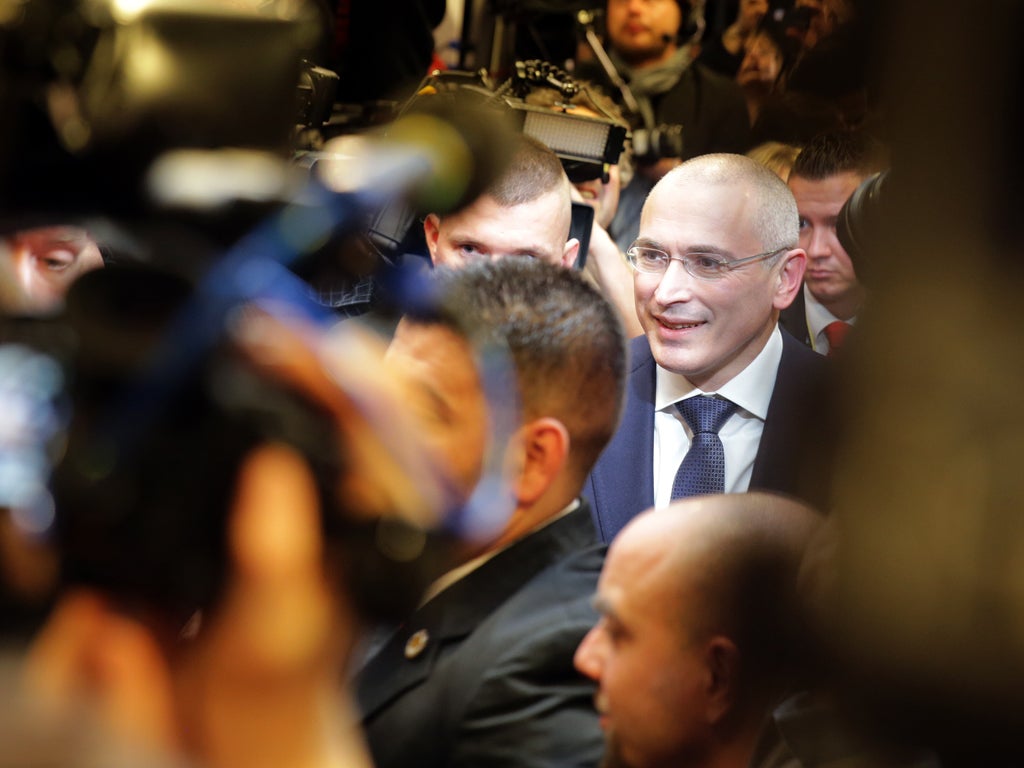The Mikhail Khodorkovsky and Pussy Riot prison releases reveal the dilemma of mature Putinism
Khodorkovsky’s release may well have been intended to further those goals by sending a positive signal about Russia's future business climate

The release of Mikhail Khodorkovsky, pardoned along with two members of Pussy Riot and the Greenpeace Arctic protestors, has been widely interpreted as a good will gesture ahead of the Sochi Winter Olympics in February. Vladimir Putin has invested the $50bn Games with huge personal authority and understands that his own prestige is at stake in their success. It therefore suits the Russian President to remove a significant potential spoiler and present a softer, humanitarian image as he prepares to play host to the world.
But there are also bigger considerations about Russia's political and economic future in play that go well beyond the immediate presentational demands of Sochi. With ten months to run on Khodorkovsky’s sentence, Putin toyed with the idea laying new charges that would have kept him in prison for many years to come. He eventually decided that the costs of doing so would outweigh the benefits and chose to take credit for his early release instead. A major part of this calculation will have been a recognition that the system he created to rescue Russia from post-Soviet decline has itself begun to exhibit signs of stagnation and needs to be reinvigorated if he wants to cement his legacy. Khodorkovsky’s release may be a way of drawing a line under the past.
A few days before Putin announced his amnesty the World Bank again downgraded its 2013 growth forecast for Russia from 1.8 per cent to 1.3 per cent. Projected growth for 2014 was also revised down from 3.1 per cent to 2.2 per cent, well below the 6-7 per cent that defined Russia’s resurgence during Putin’s first two presidential terms. In the context of an already widening budget deficit, this raises questions about his ability to fund the social transfers that have done so much to underpin domestic support. With a fiscal break-even price of oil now as high as $125 per barrel (up from $45 a decade ago), Russia also remains acutely vulnerable to an oil-price shock.
Russia’s energy dominance is, in any case, already in the process of being eclipsed as it loses market share in Europe and the United States, propelled by the shale gas revolution, overtakes it as the world’s largest producer of natural gas. This is the result of a decade in which Russia has consistently overplayed its hand leading to concern about the price and reliability of its energy supplies. Even Putin’s apparent success in engineering the recent pro-Moscow turn by the government of Ukraine comes with significant new costs attached in the form of reduced gas export revenues and new financial subsidies to Kiev.
The reality behind these figures is that Russia needs huge new injections of capital and technology to modernise its energy sector, replace ageing infrastructure and diversify into new areas of economic activity. With net capital outflows running at around $50bn a year, this money can only be found by persuading more Russians that their wealth is safe at home while attracting significant new investments from abroad. Khodorkovsky’s release may well have been intended to further those goals by sending a positive signal about Russia's future business climate. If so, it will only work if it is part of a larger reform effort that strengthens property rights, judicial independence and the rule of law, and thereby convinces investors that a repeat of the Yukos affair is unlikely.
In parallel to concerns about the economy, a debate has been taking place within the Kremlin about how to respond to the rise of the new opposition with some hinting that a more open and competitive political system might be in prospect, at least at a local level. The mass street protests that greeted Putin’s return to the presidency have been quelled thanks to a battery of new repressive measures, but not many see this as a durable solution as long as the underlying sources of middle class discontent remain unaddressed. The local elections held in September were in many ways the freest Russia has held in many years and allowed the opposition to make modest advances. Some want to go further and the release of Khodorkovsky could be seen as a gesture of accommodation whether he chooses to become involved in politics or not.
The dilemma of mature Putinism as it considers the future and its legacy for Russia is the choice between repression and reform. One raises the spectre of losing control and paving the way for anarchy, as Mikhail Gorbachev’s perestroika reforms eventually did. The other involves the risk of holding on too tight and sharing the fate of Hosni Mubarak by provoking an even stronger backlash at some point in the future. It is by no means clear how Putin himself will choose to resolve this dilemma, but it does at least seem as if the question is now being asked.
David Clark is chair of the Russia Foundation and a former Special Adviser to Robin Cook
Video: Pussy Riot members call prison release PR stunt

Join our commenting forum
Join thought-provoking conversations, follow other Independent readers and see their replies